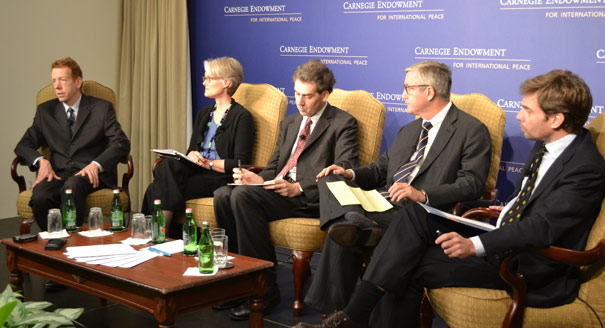Registration
Thank you!
You will receive an email confirming your registration.
Recent events in the post-Soviet European neighborhood have again put the spotlight on struggling efforts for democratization in the region. In October, Georgia experienced a historic transition of power at the ballot box, while Ukraine held a flawed election and has been widely criticized for regression in its democratic standards.
Carnegie’s Thomas de Waal, Bruce Jackson of the Project on Transitional Democracies, Laura Jewett of the National Democratic Institute, and Richard Youngs of FRIDE discussed the prospects for further democratization in Georgia and Ukraine. Carnegie’s Thomas Carothers moderated.
Assessing Georgia’s and Ukraine’s Democracies
- Elections: Democratization should not just be about conducting free and fair elections, said both Jewett and Jackson.
- Values: It is difficult to promote liberalism and civil society in a region whose values the West often explicitly does not share, stated Jackson. The post-Soviet world has not evolved much in terms of liberal values since 1991, with particularly slow movement on judicial reform, Jackson added.
- Modernization Versus Democratization: Georgia under the United National Movement was focused more on modernization than democratization, said de Waal. Cohabitation between political rivals has been difficult to achieve and politics are still dominated by feudal-style parties that are organized around charismatic individuals, he added.
- Geography: The former Soviet republics that have been the most successful with democratic reforms have been the smaller states such as Georgia, Moldova, and Kyrgyzstan, said de Waal. The regional states fall into three groups: those where the government leaves no space for pluralism and civil society, those where some space is given to reformers but skepticism over democratization persists, and lastly those states where the government is in favor of democratization and does not curtail reforms, added Jewett. She characterized Ukraine and Georgia as in that second category.
The Role of the West
- Push Back Against the West: The European Union risks being accused of double standards if it criticizes the new Georgian regime thus limiting its room for maneuver, warned Youngs. The Council of Europe and the Organization for Security Cooperation in Europe (OSCE) have lost moral authority due to internal politics, de Waal said. Furthermore, there is growing ambivalence over free trade agreements with the EU in Ukraine, since the costs are felt upfront while the benefits are more long term, added Youngs.
- Divided Europe: The pull of Europe is weakening in both Georgia and Ukraine, stated Jewett. Youngs agreed, adding that the European approach to Georgia and Ukraine is too bureaucratic. The EU risks its policies becoming seen as static and obsolete in the region, when it imposes conditions over democratic shortcomings which are ignored by local governments, remarked Jackson. For example, the Yulia Tymoshenko case has frozen E.U.-Ukraine relations, and within the EU, states are undecided over whether to pursue sanctions, sign the Deep and Comprehensive Free Trade Agreement, or to make her release a condition of signing the DCFTA agreement, added Youngs.
- Rethinking Strategies: There are opportunities in both Georgia and Ukraine for constructive projects, such as promoting women in Ukrainian politics, said Jewett. Transparency International has done a lot of good work in Georgia, and there is still significant Western leverage there since Russia is not in the picture, added de Waal. Youngs agreed, pointing out that the EU has increased spending on the Eastern Partnership program and is currently trying new approaches such as the Civil Society Forum that promotes bottom up reforms.
